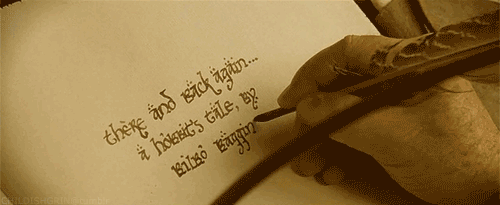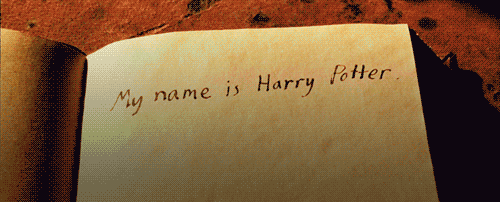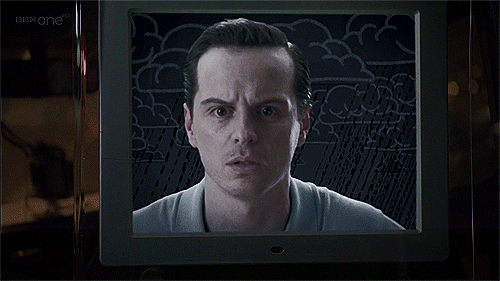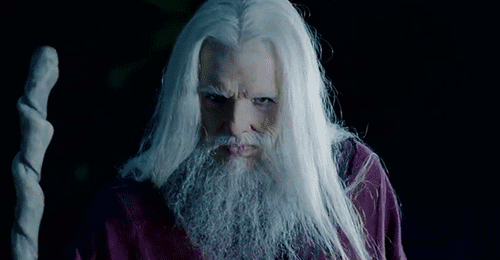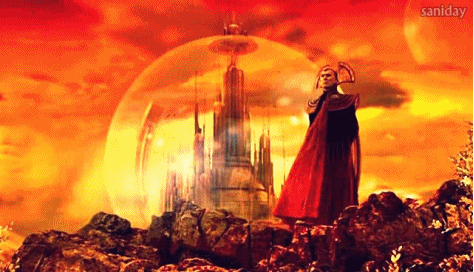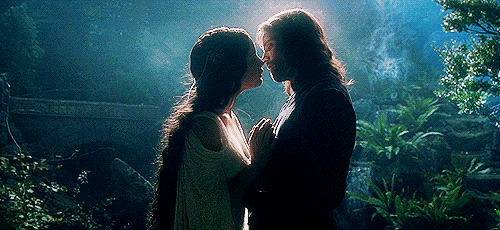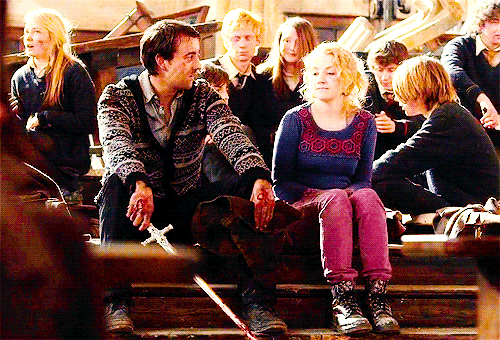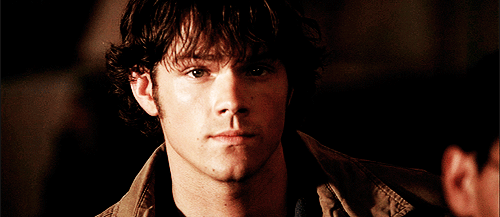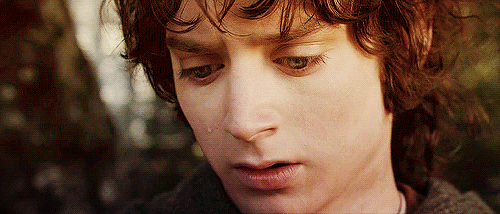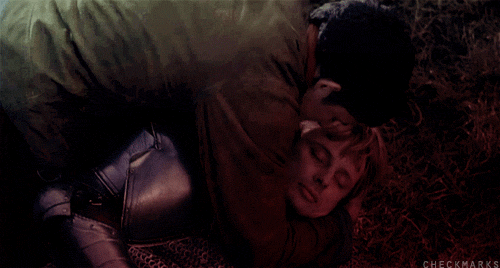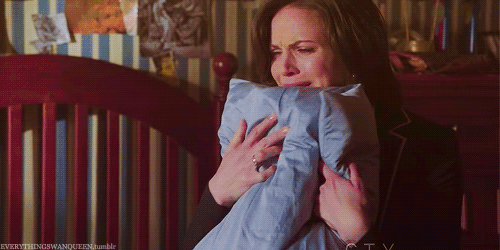Look, your writing doesn’t say anything about you.
I mean, it comes from you. But whether you write something good or something bad, it doesn’t mean anything. A story isn’t a sign. It doesn’t prove your talent or lack thereof.
A story is something you make, not something you are.
To return to a metaphor I used once: think about making pancakes. Sometimes you turn out an A+ pancake, and sometimes you burn the shit out of one. You make another one, they all go in the pile, and there’s always someone who enjoys the burnt ones. You would never take a single pancake and say it alone represents your pancake-making talent forever, or that it reveals how smart, interesting, or lovable you are. We can’t judge your soul by a pancake. It’s made of batter.
And someone always eats the burnt ones.
A small conversation about stories with @writingfanficsfan because of this post led to today’s random profound thought:
Hope is a story we tell ourselves. We will get better. Things are improving. This is who we can be.
I am really baffled by the people attacking AO3 for hosting stories that involve rape, incest, pedophilia, and other dark things. Have…have they never been to a bookstore or library? People write stories about all manner of dark, horrible things. This is not remotely new. And at least on AO3 and other fandom platforms, the dark things are generally tagged. In bookstores and libraries, not so much.
V.C. Andrews was freaking popular when I was in jr. high and high school. Her books were in the school libraries. They needed to be stamped with trigger warning: EVERYTHING, but mainly things from the fun list of rape, incest, pedophilia, and child abuse. Her books are still sufficiently popular that there are new ones coming out despite the fact that she’s been dead for years!
Her books are in the library I work at. Her books are in most bookstores. Her books are probably still in the libraries of the jr high and high school I went to. Does that mean anywhere that has her books supports rape, incest, pedophilia, and child abuse?
That’s not how it works. Yes, there are occasionally things that a store or library will decide they don’t want to carry, no matter what. The first bookstore I worked at wouldn’t even special order The Turner Diaries. A lot of bookstores won’t even special order The Anarchist Cookbook. I’m sure there are other books out there that people are reluctant to touch, even with a ten foot pole. But, barring those few exceptions, most bookstores and libraries are not in the business of policing the content of the books they deal in.
Not because booksellers and librarians are all monsters who should be reported to the FBI, but because there’s a long history of censorship going very bad places very fast. Also, free speech is considered an American value. Hell, let me just link to the ALA page on censorship.
I don’t pretend to know why stuff like V.C. Andrews’ books, or the fics on AO3 that some people want to report to the FBI, are popular. I don’t get it. It doesn’t appeal to me. Yet I recognize that different dark things are in kinds of fiction that I do like – violence, murder, torture, war, other things that most of us really fervantly hope never to experience in our lives. I don’t know whether fiction is an outlet for whatever darkness lurks in everyone’s hearts, whether it’s a way of dealing with our fear of bad things happening, whether human culture just finds bad things fascinating, or what. Maybe humanity is just super fucked up and Pluto really is a warning buoy telling other civilizations not to go near the planet with the creepy mammal infestation on it.
But I don’t think going after fic platforms because some of the fic hosted there is disturbing is a solution to anything. (And if the people doing so are not also on an equivalent campaign against bookstores and libraries, I suspect that what’s going on is not what they claim is going on.)
VC Andrews was ABSOLUTELY the first thing I thought of when I started hearing about this, because hoooooo my god. And I definitely remember being able to get my hands on those at a young age.
There’s plenty of shit I don’t want to read on AO3. Luckily, that stuff – or at least most of it! – is TAGGED, so I don’t have to. That’s the ENTIRE POINT. It’s not breaking a law, and you are not being forced to read it.
Fandom purity politics are fucking tiring.
“Have…have they never been to a bookstore or library?”
This!!!
I work in a library. Specifically, I work in the children’s section. Obviously, that’s where we keep age appropriate books.
But nothing is stopping those children from wandering around the library and reading a graphic book. Nothing but their parents, that is, but let me tell you, people treat the library like daycare.
It’s not my job to watch over those children and hold their hand. It’s not my responsibility, nor do I want it to be, either in person or online.
You make your own fandom experience. At least fanfiction is tagged.
I worked at a book store. A kid wanted to read Steven King’s “It”. That book has abuse and sex and sex between children and isn’t appropriate for 13 year olds.
That’s not my call to make since it wasn’t my kid, but I did ask the parent if they’d read the book and when they said they hadn’t I did take the parent aside and let them know there is adult content. The parent then decided they weren’t comfortable getting them that book, so I suggested other Steven King books that are less graphic and more age appropriate for a kid that wants to read adult horror (Carrie, Pet Cemetery) and the Meddling Kids which has a similar plot like to “IT” (people who dealt with a monster as children return home as adults to deal with monsters again) but is more grown up Scooby Doo level stuff.
(Seriously, someone needs to write a YA horror series because kids need something between RL Stine and Steven King).
So the kid got three books instead of one big one, and still got what they were looking fo and I felt good about it but you know what – most book sellers would have probably just sold the book since the job is to make sales. And no library would have stopped a kid from checking “It” out.
But just because “It” is not for children doesn’t mean it shouldn’t be available for anyone. Because after the movie came out my store sold out of “It” for awhile and I had a man come in who bought that last copy in the store. He told me he’d never been in a bookstore before and he hadn’t read a book since he was forced to read books for school as kid.
So many adults just stop reading after High School.
And here is this man who is going buy and voluntarily read a giant book (“It” is a brick and could have been split into smaller books). That’s amazing!
Books are a good thing, even if they aren’t for children or aren’t for everyone and have disturbing things, people enjoying books doesn’t hurt anyone.
And if people are reading stories online instead of books, hey they’re still reading!
Using your brain faculties to analyse what yu read – or do not read and do not want to read – is a thing! Reading something does not equal either supporting that hting, wanting to experience the thing, wanting someone esle to experience the thing. We read – and write – a lot of things for a lot of different reasons that are not in an one-to-one correlation with reality. This is why it is called FICTION. A few facets and purposes of fiction is to allow or make you to think or experience emotions – also those that you might never encounter in reality, or analyse concepts that are safer to analyse in fiction. Dammit, why is it so hard to understand? Why does every generation get their own stupid Fahrenheit 451 zombie acolytes of ‘purity’?
reblogging for
“Fahrenheit 451 zombie acolytes of ‘purity’”This is the second time I’ve seen this on my dash so I want to say something about it. It’s not a problem with the content being sensitive. Usually authors will mark it with sensitive content and that’s that. Nothing wrong there. But there is a stark difference between sensitive material in novels and sensitive material in fanfiction which makes this comparison unable to stand on its own.
Novels have publishers. Before a book can get published, it typically goes through a publication process. If a book is advocating for sensitive content (i.e pro-rape, pedophilia, incest, whatever) then it will stop at the publisher and is prevented from being published in most cases. Yes, there is an option to self-publish, but unless you’re writing the new Fifty Shades, you’re not likely to get your nasty opinion to the public.
However, AO3 is a self publishing site. There are no prerequisites to meet before you send your work to the online world for anyone to view for as long as you want. This is dangerous not because there are sensitive topics, but because people sexualize and romanticize abuse and rape and pedophilia and incest. That’s what people are angry over, not because it’s in there in the first place. You can’t compare fanfiction to a novel because 1. It’s a different issue than you think 2. Books go through a different process in order to be publicized.
Long story short, you can’t scream that people are oppressing and censoring your works just because they have sensitive content when the real problem is people making porn out of it.
you can either support bills that would prevent the creation of fandom content like in britain, or you can monitor your child’s access to the internet. people try to lessen the consequences of children using the internet unsupervised and you cry oppression. you can’t have it both ways.
Ok, a) apollomutual has clearly never actually read VC Andrews, if they think that it’s just “about sensitive content” and isn’t straight-up sexualizing/romanticizing underage sibling rape. They’re just supporting the “antis clearly don’t READ fucking BOOKS” hypothesis.
b) @slaprod-jones, are you a parent? Because I am. And I don’t want anyone making decisions about what is appropriate for my son to read except for ME, thank you very much. He is seven. He does not get to use the internet unsupervised and will not get to for several more years, and when he does it will be a slow progression of getting more access and less monitoring as he proves himself mature enough to handle it.
I’ve seen posts on this site claiming that monitoring kids’ internet access is an overly-controlling abuse tactic – and yes, it can be used for abuse, but so can a hand and I get to keep those. But 90% of the time it’s just called good parenting. The fact that some parents don’t do it when they should does not mean that the entire world needs to bend over backwards to do it for them by restricting what adults can post, access, and read.
I would be pissed if a librarian tried to dictate what books he could or couldn’t check out. No, I won’t let him read VC Andrews or It anytime soon, not til he’s a teenager. But I get to decide that, not you, not the librarian, not some panel of people somewhere deciding what is and isn’t okay to read. My mom handed me Flowers in the Attic when I was 12. That was her decision to make. I probably wouldn’t let him read it at 12, but I sure as hell wouldn’t make him wait til he was 18. Already AO3 is more restrictive than me in that regard, in that he’d at the very least have to lie about his age to get access to anything as graphic as that book.
“About two-thirds of the way through production, we changed the story to Judy’s story… we said, let’s just try, as an experiment, making Judy the main character — since she’s an optimist, she sees the best in everything — let’s try making it her story and see what happens.” – Zootopia director, Rich Moore (x)
If you ever worry that it’s too late to change a story remember that zootopia changed their lead on a fully animated film a year before release…and pulled it off. Yes they had to scrap work that had been done, but the film was better in the end.
The earliest storytellers were magi, seers, bards, griots, shamans. They were, it would seem, as old as time, and as terrifying to gaze upon as the mysteries with which they wrestled. They wrestled with mysteries and transformed them into myths which coded the world and helped the community to live through one more darkness, with eyes wide open and hearts set alight.
“I can see them now, the old masters. I can see them standing on the other side of the flames, speaking in the voices of lions, or thunder, or monsters, or heroes, heroines, or the earth, or fire itself – for they had to contain all voices within them, had to be all things and nothing. They had to have the ability to become lightning, to become a future homeland, to be the dreaded guide to the fabled land where the community will settle and fructify. They had to be able to fight in advance all the demons they would encounter, and summon up all the courage needed on the way, to prophesy about all the requisite qualities that would ensure their arrival at the dreamt-of land.
“The old masters had to be able to tell stories that would make sleep possible on those inhuman nights, stories that would counter terror with enchantment, or with a greater terror. I can see them, beyond the flames, telling of a hero’s battle with a fabulous beast – the beast that is in the hero.”
“The storyteller’s art changed through the ages. From battling dread in word and incantations before their people did in reality, they became the repositories of the people’s wisdom and follies. Often, conscripted by kings, they became the memory of a people’s origins, and carried with them the long line of ancestries and lineages. Most important of all, they were the living libraries, the keepers of legends and lore. They knew the causes and mutations of things, the herbs, trees, plants, cures for diseases, causes for wars, causes of victory, the ways in which victory often precipitates defeat, or defeat victory, the lineages of gods, the rites humans have to perform to the gods. They knew of follies and restitutions, were advocates of new and old ways of being, were custodians of culture, recorders of change.”
“These old storytellers were the true magicians. They were humanity’s truest friends and most reliable guides. Their role was both simple and demanding. They had to go down deep into the seeds of time, into the dreams of their people, into the unconscious, into the uncharted fears, and bring shapes and moods back up into the light. They had to battle with monsters before they told us about them. They had to see clearly.”
“They risked their sanity and their consciousness in the service of dreaming better futures. They risked madness, or being unmoored in the wild realms of the interspaces, or being devoured by the unexpected demons of the communal imagination.”
“And I think that now, in our age, in the mid-ocean of our days, with certainties collapsing around us, and with no beliefs by which to steer our way through the dark descending nights ahead – I think that now we need those fictional old bards and fearless storytellers, those seers. We need their magic, their courage, their love, and their fire more than ever before. It is precisely in a fractured, broken age that we need mystery and a reawoken sense of wonder. We need them to be whole again.
The thing about telling a story is that it helps you believe you have a story to tell…Your story matters. Let it make you mighty.
the-winchesters-and-their-angel:
A good story
can come in many forms;
A book,
a video,
or a tale.
It doesn’t matter where it comes from,
or how it was made,
as long as it touches
our
hearts …
softens
our
souls …
and
makes
us
feel.
That is what makes a story.
The End
this is so beautiful
My cousin Helen, who is in her 90s now, was in the Warsaw ghetto during World War II. She and a bunch of the girls in the ghetto had to do sewing each day. And if you were found with a book, it was an automatic death penalty. She had gotten hold of a copy of ‘Gone With the Wind’, and she would take three or four hours out of her sleeping time each night to read. And then, during the hour or so when they were sewing the next day, she would tell them all the story. These girls were risking certain death for a story. And when she told me that story herself, it actually made what I do feel more important. Because giving people stories is not a luxury. It’s actually one of the things that you live and die for.

